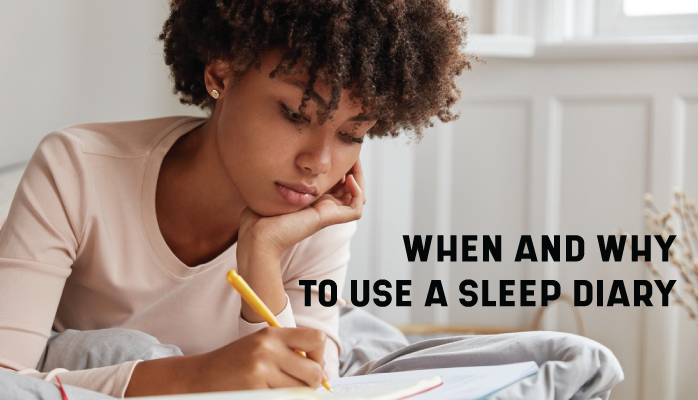If you've ever had trouble sleeping, a sleep diary may be a great way for professionals to gain some insight into what may be the cause and how best to help you. Sleep is really important for your overall health, so if you’re struggling with your sleep, then you may begin to experience other health issues. Weight gain, stress exhaustion, depression, skin issues, etc., may be some of the consequences of inadequate sleep.
One of the things you can do if you are having trouble sleeping is to keep a sleep diary that you can take to a sleep specialist. This way you can get a better idea of your sleep patterns, and they have an idea as well. Let's talk more about what a sleep diary is and how it can help you and your sleep issues.
What is a Sleep Diary?
A sleep diary is an ongoing log of your sleeping habits. It's not just about when you sleep, but about how you sleep. A sleep diary may be requested by sleep professionals so it may be more beneficial to start a sleep diary before going to see a sleep expert. This way you’ve eliminated one step and can move forward in diagnosis.
When keeping a sleep diary, it is important to include what time you lay down, and when you wake up in the morning, as well as some estimates about what time you think you fell asleep. Sleep latency is the amount of time it takes you to go to sleep. Normal sleep latency is about 7-15 minutes, so if it takes you longer, that will be helpful information for sleep clinicians. If you have trouble staying asleep throughout the night, make sure you note how many times you wake up and about what time(s).
It is also important to include your nighttime routine, or what you do before going to bed, for instance drinking caffeine, watching TV, exercising, anything that may potentially impact your ability to get a good night's rest. Keep your diary for at least two weeks and there is no limit to how much you include. Even include bad days or stressors that you’re going through, because that, too, could be impacting your ability to get a good night’s sleep.
Even if not requested by your doctor, it's a good idea to keep one if you are struggling with sleep - it only takes a few minutes each day. Just wake up, and before reaching for your phone, grab your sleep diary and quickly jot down everything you remember from the night before:
- Sleep time
- Sleep latency (estimated)
- Wake time
- Number of wake times
- Pre-bed routine
- Previous stressors from the day
- Nightmares, active dreams, sleep behaviors
- Restlessness, etc.
- Snoring (as reported by sleeping partners)
- Workout (amount and time)
- Alcohol consumed
- Scale quality of sleep 1-10
When and Why to Use a Sleep Diary
Anyone can keep a sleep diary, but especially if you have trouble sleeping. You know that you are having trouble sleeping if you experience any of the following:
- Wake up in the morning feeling exhausted
- Excessive daytime sleepiness
- Soreness
- Irritability or mood swings
- Inability to concentrate or focus
If you are having trouble falling or staying asleep, then it’s important to find the root of the problem. Sleep diaries are the cheapest and easiest way to begin that process. Sleep studies and medication are down the road, but sleep diaries are something you can start at any time and are relatively inexpensive.
Simply buy a journal from the store or pick up one you already have. Then, make sure to date individual pages, and jot down the above details about your sleeping. You may find a pattern on your own and be able to self-correct if you find some pre-sleep routines give you better sleep than others. However, if your problems are beyond sleep routines, then you can take your sleep diary into sleep.
Red Flags When Reviewing Your Sleep Diary
Some things to pay attention to in your sleep diary are:
- Are you getting at least 7 hours of sleep consistently?
- Are you feeling catastrophically tired when you wake up?
- Are you rousing throughout the night?
- Are you drinking excessive amounts of coffee or alcohol?
- Are your nighttime activities conducive to sleep?
In the activity of analyzing your sleep diary, what you are looking for are patterns. A sleep specialist or doctor can assist you in doing this – contact us for more details.
If you are struggling with sleep and want to find out more about getting help with your sleep issues, start by taking this online sleep test:


